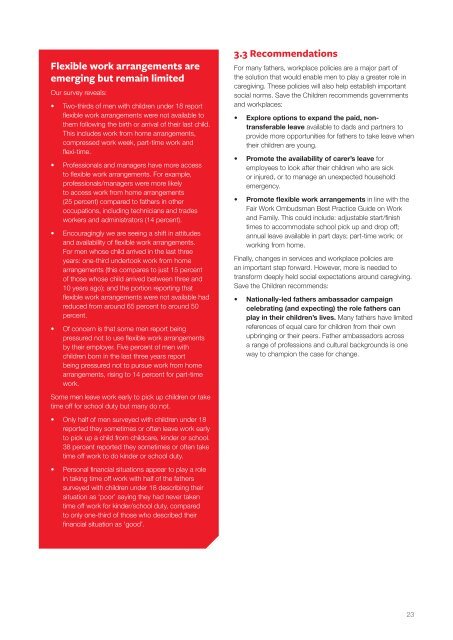State of Australia’s Fathers
1iGWp7w
1iGWp7w
- No tags were found...
Create successful ePaper yourself
Turn your PDF publications into a flip-book with our unique Google optimized e-Paper software.
Flexible work arrangements are<br />
emerging but remain limited<br />
Our survey reveals:<br />
• Two-thirds <strong>of</strong> men with children under 18 report<br />
flexible work arrangements were not available to<br />
them following the birth or arrival <strong>of</strong> their last child.<br />
This includes work from home arrangements,<br />
compressed work week, part-time work and<br />
flexi-time.<br />
• Pr<strong>of</strong>essionals and managers have more access<br />
to flexible work arrangements. For example,<br />
pr<strong>of</strong>essionals/managers were more likely<br />
to access work from home arrangements<br />
(25 percent) compared to fathers in other<br />
occupations, including technicians and trades<br />
workers and administrators (14 percent).<br />
• Encouragingly we are seeing a shift in attitudes<br />
and availability <strong>of</strong> flexible work arrangements.<br />
For men whose child arrived in the last three<br />
years: one-third undertook work from home<br />
arrangements (this compares to just 15 percent<br />
<strong>of</strong> those whose child arrived between three and<br />
10 years ago); and the portion reporting that<br />
flexible work arrangements were not available had<br />
reduced from around 65 percent to around 50<br />
percent.<br />
• Of concern is that some men report being<br />
pressured not to use flexible work arrangements<br />
by their employer. Five percent <strong>of</strong> men with<br />
children born in the last three years report<br />
being pressured not to pursue work from home<br />
arrangements, rising to 14 percent for part-time<br />
work.<br />
3.3 Recommendations<br />
For many fathers, workplace policies are a major part <strong>of</strong><br />
the solution that would enable men to play a greater role in<br />
caregiving. These policies will also help establish important<br />
social norms. Save the Children recommends governments<br />
and workplaces:<br />
• Explore options to expand the paid, nontransferable<br />
leave available to dads and partners to<br />
provide more opportunities for fathers to take leave when<br />
their children are young.<br />
• Promote the availability <strong>of</strong> carer’s leave for<br />
employees to look after their children who are sick<br />
or injured, or to manage an unexpected household<br />
emergency.<br />
• Promote flexible work arrangements in line with the<br />
Fair Work Ombudsman Best Practice Guide on Work<br />
and Family. This could include: adjustable start/finish<br />
times to accommodate school pick up and drop <strong>of</strong>f;<br />
annual leave available in part days; part-time work; or<br />
working from home.<br />
Finally, changes in services and workplace policies are<br />
an important step forward. However, more is needed to<br />
transform deeply held social expectations around caregiving.<br />
Save the Children recommends:<br />
• Nationally-led fathers ambassador campaign<br />
celebrating (and expecting) the role fathers can<br />
play in their children’s lives. Many fathers have limited<br />
references <strong>of</strong> equal care for children from their own<br />
upbringing or their peers. Father ambassadors across<br />
a range <strong>of</strong> pr<strong>of</strong>essions and cultural backgrounds is one<br />
way to champion the case for change.<br />
Some men leave work early to pick up children or take<br />
time <strong>of</strong>f for school duty but many do not.<br />
• Only half <strong>of</strong> men surveyed with children under 18<br />
reported they sometimes or <strong>of</strong>ten leave work early<br />
to pick up a child from childcare, kinder or school.<br />
38 percent reported they sometimes or <strong>of</strong>ten take<br />
time <strong>of</strong>f work to do kinder or school duty.<br />
• Personal financial situations appear to play a role<br />
in taking time <strong>of</strong>f work with half <strong>of</strong> the fathers<br />
surveyed with children under 18 describing their<br />
situation as ‘poor’ saying they had never taken<br />
time <strong>of</strong>f work for kinder/school duty, compared<br />
to only one-third <strong>of</strong> those who described their<br />
financial situation as ‘good’.<br />
23


